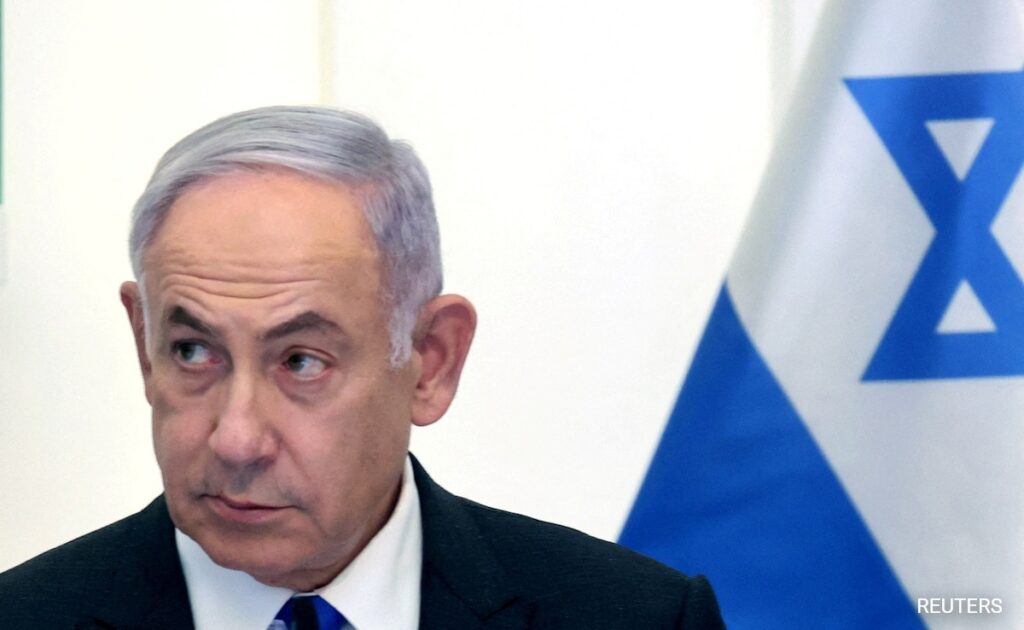At the very least, it is now clear that Benjamin Netanyahu has a strategy for the Gaza war, one that will embroil his country in an indefinite conflict.
This seems the only logical conclusion that can be drawn from the television interview the Israeli prime minister gave to Channel 14 on Sunday, an interview that was both disturbing and revealing. In his first briefing with domestic media since Hamas' terror attacks more than eight months ago, Netanyahu rejected the terms of a Gaza ceasefire proposal brokered by the United States and endorsed by the UN Security Council, and said he was ready to open a second front against Hezbollah in Lebanon.
This is not to deny that Israel faces extremely difficult decisions, nor to absolve Hamas of primary guilt for the disaster it has inflicted on Palestinians in Gaza since October 7. But it is becoming increasingly difficult to dismiss the claims of Israeli critics that the war is necessary to avoid Netanyahu being held personally responsible for security failures, as his government has been toppled by right-wing forces. The need for the war to continue is shared by Hamas leader Yahya Sinwar, who rightly believes it serves the purpose of weakening and ultimately destroying Israel.
Netanyahu told reporters that heavy fighting in Gaza would end “soon” and that Israel would move into a new phase in which it would maintain security control in the Strip while “wiping out” any remaining Hamas forces if necessary. He also said that Israel would hand over responsibility for civil administration to the Palestinians (not the Palestinian Authority), supported by regional countries, rather than to the Palestinian Authority.
But at the same time, Netanyahu ruled out any path to a Palestinian state, saying he would only accept a temporary ceasefire to ensure the release of hostages held by Hamas, after which fighting must resume. The prime minister's office later appeared to backtrack and said Israel remained committed to a U.S.-led peace proposal aimed at a lasting end to hostilities, even if the process was divided into stages. Meanwhile, Israel's Arab neighbors have made clear they would only get involved in post-war Gaza once a permanent ceasefire and a roadmap for Palestinian statehood is in place.
In other words, the only viable part of Netanyahu's strategy is a long-term military occupation of Gaza, with the prospects for any peace talks made even worse by the crisis in the West Bank, where hard-line Israeli cabinet members have cut off funding for the Palestinian Authority and supported Jewish settler activity.
Most worryingly for the young state of Israel, Prime Minister Netanyahu said he would move troops released from the war in Gaza to Israel's northern border with Lebanon, and said Israel would fight on multiple fronts if necessary to stop Hezbollah from firing rockets and missiles that are forcing the evacuation of Israeli towns and villages along the border.
Last week, apparently concerned that Netanyahu was planning a full-scale invasion, Hezbollah leader Hassan Nasrallah warned that if Israeli forces invaded, it would mean a war “without constraints, without rules, without any restrictions.” That is looking increasingly likely.
All this is at odds with the US administration's core objective: to end the bloodshed in Gaza, which is damaging both US interests across the Middle East and President Joe Biden's chances of reelection, while at the same time avoiding an escalation into a regional war that could embroil not only Hezbollah but also its backer, Iran. Here too, Netanyahu is playing a hard line. On Sunday, he doubled down on claims (fullly denied by Washington officials) that the US is cutting arms supplies to Israel, with only trickle arriving in the past four months.
Details of the US arms shipment have not been made public, but it seems like a clear attempt by Prime Minister Netanyahu to pin the blame on the US for failing to achieve the unrealistic goal he set for eliminating Hamas. As I and many others have said before, we can punish Hamas militarily and weaken its ability to stage a second October 7 terror attack, but we cannot eliminate Hamas without removing all Palestinians from Gaza. No amount of weapons will change that.
Next month, Netanyahu is expected to take brinkmanship a step further when he addresses the U.S. Congress in the midst of the presidential election campaign — an aggressive and highly partisan move, whatever the survivors of Israel's extraordinary politics may say.
Netanyahu's uncompromising stance, like much of what he does, will likely win him the support of many Israelis who will be still traumatized by October 7 and yearning to regain a sense of former security. But that confidence was illusory. Netanyahu's strategy risks widening the war on multiple fronts, alienating potential Arab partners, and doing lasting damage to the bipartisan American support that has underpinned Israel's security for decades.
This will please Hamas and prevent the collapse of Netanyahu's government. In the long run, it will be a disaster for the Israeli, Lebanese and Palestinian people. Tens of thousands of Israelis protested over the weekend, demanding the return of all the hostages and early elections to elect a government better suited to steer Israel out of the violent impasse that Netanyahu and Hamas have led it into. They were right.
Mark Champion is a Bloomberg Opinion columnist covering Europe, Russia and the Middle East and was previously the Istanbul bureau chief for The Wall Street Journal.
Disclaimer: These are the personal opinions of the author.
(Except for the headline, this story has not been edited by NDTV staff and is published from a syndicated feed.)
Today's Featured Video
Julian Assange released from UK prison in plea deal with US



